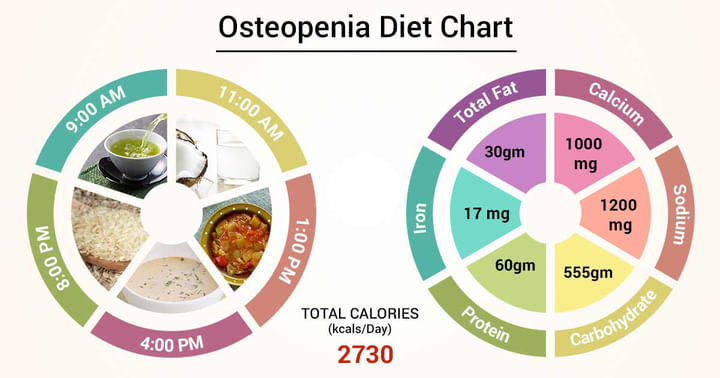Diet Chart For osteopenia
Last Updated: Jan 20, 2025
About
Osteopenia is a medical condition in which bone tissues lose their protein content and minerals. This condition might turn into osteoporosis if not looked after by proper osteopenia diet. Osteopenia results in lower bone density. In this situation, bones become so fragile that they break easily with a light blow. This condition can be avoided with a proper diet consisting of mainly Calcium and Vitamin D. Adults need average around 1000-1200 mg Calcium and 400-800 IU of Vitamin D every day. Dairy products, green vegetables, fish, a vegan diet such as tofu, eggs etc. can replenish the Calcium content.
The diet should be taken according to the severity of the condition. While certain diet may help with the situation, other may give undesired results like high consumption of alcohol, smoking, and meal with high protein. Consumption of these harmful substances may hinder the calcium absorption.
However, following is the list of Osteopenia diet that should be followed in case of Osteopenia along with enough amount of sunshine (15 min) every day:
- Dairy Products such as butter, yogurt, cheese, milk, etc.
- Leafy green vegetables like collard greens, broccoli, etc.
- Egg yolks
- Fish such as Tuna, fish liver oil, etc.
- Sesame seeds, almonds, dark chocolates and black beans, etc.
Diet Chart
| Sunday | |
| Breakfast (8:00-8:30AM) | Poached Egg(2) + Toast (2 slices) + Green Tea(1 cup) with Honey(1tsp) + 2 Cashew nuts + 5-6 Almonds + 3-4 Raisins |
| Mid-Meal (11:00-11:30AM) | Tender coconut water (1/2 cup) + 1 Kiwi |
| Lunch (2:00-2:30PM) | 2 Chapati + Malabar Spinach n Pumpkin curry (1/2 cup) + Raita (1/3rd cup) + 1/4th Fresh Lime |
| Evening (4:00-4:30PM) | Kale n Spring onion soup (1/2 cup) |
| Dinner (8:00-8:30PM) | Parboiled Rice (1/2 cup) + Potato n Drumstick curry (1/3rd cup) + |
| Monday | |
| Breakfast (8:00-8:30AM) | Oats n Milk (1/2 cup) + 2 Cashew nuts + 5-6 Almonds + 3-4 Raisins |
| Mid-Meal (11:00-11:30AM) | Tender coconut water (1/2 cup) + 1 Custard Apple |
| Lunch (2:00-2:30PM) | 2 Chapati + Sardine Fish Curry (1/2 cup) + Roasted papad (1) + 1/4th Fresh Lime |
| Evening (4:00-4:30PM) | Rice Flakes chat (1/2 cup) + Green Tea (1 cup) |
| Dinner (8:00-8:30PM) | 2 Chapati + Mix Veg. (1/3rd cup) |
| Tuesday | |
| Breakfast (8:00-8:30AM) | Thai Mushroom soup (1 cup) + 2 Cashew nuts + 5-6 Almonds + 3-4 Raisins |
| Mid-Meal (11:00-11:30AM) | Tender coconut water (1/2 cup) + 1 Orange |
| Lunch (2:00-2:30PM) | 2 Chapati + Palak Paneer (1/2 cup) + 1/4th Fresh Lime |
| Evening (4:00-4:30PM) | Boiled Corn n Carrot Chat (1/2 cup) + Green Tea (1 cup) |
| Dinner (8:00-8:30PM) | Mashed Rice (1/2 cup) + Milk (1/3rd cup) + Jaggery (2 tsp) |
| Wednesday | |
| Breakfast (8:00-8:30AM) | Steamed Brussel sprouts n Spring Onions (1/2 cup) + Green Tea(1 cup) with Honey(1tsp) + 2 Cashew nuts + 5-6 Almonds + 3-4 Raisins |
| Mid-Meal (11:00-11:30AM) | Tender coconut water (1/2 cup) + 2 Dates |
| Lunch (2:00-2:30PM) | 2 Chapati + Mustard Greens (1/2 cup) + Raita (1/3rd cup) + 1/4th Fresh Lime |
| Evening (4:00-4:30PM) | Mur-mure Chat (1/2 cup) + Green Tea (1 cup) |
| Dinner (8:00-8:30PM) | 2 Chapati + Baked Beetroot n Carrot (1/3rd cup) |
| Thursday | |
| Breakfast (8:00-8:30AM) | Scrambled Eggs with Baked Tomato n Bell pepers (1/2 cup) + Green Tea(1 cup) with Honey(1tsp) + 2 Cashew nuts + 5-6 Almonds + 3-4 Raisins |
| Mid-Meal (11:00-11:30AM) | Tender coconut water (1/2 cup) + 1 Custard Apple |
| Lunch (2:00-2:30PM) | 2 Chapati + Watercress curry (1/2 cup) + Roasted Papad (1) + 1/4th Fresh Lime |
| Evening (4:00-4:30PM) | Sprouts (1/2 cup) |
| Dinner (8:00-8:30PM) | Parboiled Rice (1/2 cup) + Fish(1pcs) stew (1/3rd cup) |
| Friday | |
| Breakfast (8:00-8:30AM) | Broccoli with Spring Onions n Mushroom soup (1 cup) + 2 Cashew nuts + 5-6 Almonds + 3-4 Raisins |
| Mid-Meal (11:00-11:30AM) | Tender coconut water (1/2 cup) + 1 Orange |
| Lunch (2:00-2:30PM) | 2 Chapati + Rajma (1/2 cup) + Raita (1/3rd cup) + 1/4th Fresh Lime |
| Evening (4:00-4:30PM) | Boiled Corn n Carrot Chat (1/2 cup) + Green Tea (1 cup) |
| Dinner (8:00-8:30PM) | Khichdi (1/2 cup) + Baked Potato (1/3rd cup) |
| Saturday | |
| Breakfast (8:00-8:30AM) | Sprouts (1/2 cup) + Green Tea(1 cup) with Honey(1tsp) + 2 Cashew nuts + 5-6 Almonds + 3-4 Raisins |
| Mid-Meal (11:00-11:30AM) | Tender coconut water (1/2 cup) + 2 Dates |
| Lunch (2:00-2:30PM) | 2 Chapati + Paneer curry (1/2 cup) + 1/4th Fresh Lime |
| Evening (4:00-4:30PM) | Rice Flakes chat (1/2 cup) + Green Tea (1 cup) |
| Dinner (8:00-8:30PM) | 2 Chapati + Spinach Curry (1 cup) + 1 Roasted Papad |
Food Items To Limit
- The food stuffs that limit calcium absorption should be limited.
- Phytates: Found in nuts, seeds and grains. They easily bind to calcium therefore limiting its availability for absorption. Try not to eat phytate-containing foods and dairy foods together.
- Oxalates: Found in sweet potatoes, rhubarb, spinach and beetroot. Very reactive molecules. Bind to calcium therefore reducing its absorption. Interfere with calcium storage in cells. Don’t eliminate these food just be aware that they are not the best providers of calcium.
- Alcohol: Interferes with vitamin D activation by the liver and kidneys. Inhibits vitamin D activating enzymes in the liver. It is a diuretic therefore it increases calcium excretion through urine. Increases Parathyroid hormone (PTH) levels and therefore decreases calcium reserves in the body. Try to limit your alcohol intake.
- Caffeine: Drinking more than 3 cups of tea or coffee per day seems to decrease calcium absorption. It is believed that caffeine decreases calcium absorption by interfering with vitamin D absoprtion.
Do's And Dont's
Do's:
- Include high calcium rich foods (beans, milk, cheese, tofu, fish, dry fruits)
- Eat fresh, alkalizing vegetables and fruits every day, preferably organic.
Don'ts:
- Avoid consumption of caffeinated products.
- Limit the intake of phosphorus containing foods- meat, soft drinks.
- Never consume Iron rich foods along with calcium rich foods as that might lead to malabsorption.
- Foods with high levels of oxalic acid such as spinach, collard greens, sweet potatoes, rhubarb and beans prevent calcium absorption. So don't consume calcium rich foods along with these foods.
- Don’t eat foods that contain artificial colors, sweeteners, and preservatives.
Food Items You Can Easily Consume
- Cereals & cereal products: Ragi, bajra, whole wheat flour. Pulses & Legumes: Lentils, peas, kidney beans, chickpeas, toor daal, soy beans.
- Fruits & Vegetables: Custard apples, chikus, apple, white jamun, grapes, lemons, oranges, raw mangoes, carrots, beetroots, bottle gourd, bitter gourds, spinach, Indian spinach, colocasia, drumsticks, yam, taro, tapioca, coriander leaves, celery, spring onions, garlic, ginger.
- Milk & milk products: Milk liquid, curd, cottage cheese, ghee, chhach, lassi, custard.
- Meat, Fish & Poultry: Sweet and salt water fishes (especially beneficial if taken with bones), eggs, Chicken (lean and/or fowl).
- Nuts & Oils: Almonds, raisins, pista, walnuts, vegetable oil, mustard oil.
- Fortified breakfast cereals, juices, milk products, yogurt, and margarine.
References
- Valdimarsson T, Löfman O, Toss G, Ström M. Reversal of osteopenia with diet in adult coeliac disease. Gut. 1996 Mar 1;38(3):322-7. [Cited 27 June 2019]. Available from:
- McFarlane XA, Bhalla AK, Robertson DA. Effect of a gluten free diet on osteopenia in adults with newly diagnosed coeliac disease. Gut. 1996 Aug 1;39(2):180-4. [Cited 27 June 2019]. Available from:
- Osteopenia. HealthLinkBC, British Columbia 2018 [Internet]. healthlinkbc.ca. [Cited 27 June 2019]. Available from:
Table of content
Find Dietitian/Nutritionist near me
Ask a free question
Get FREE multiple opinions from Doctors



